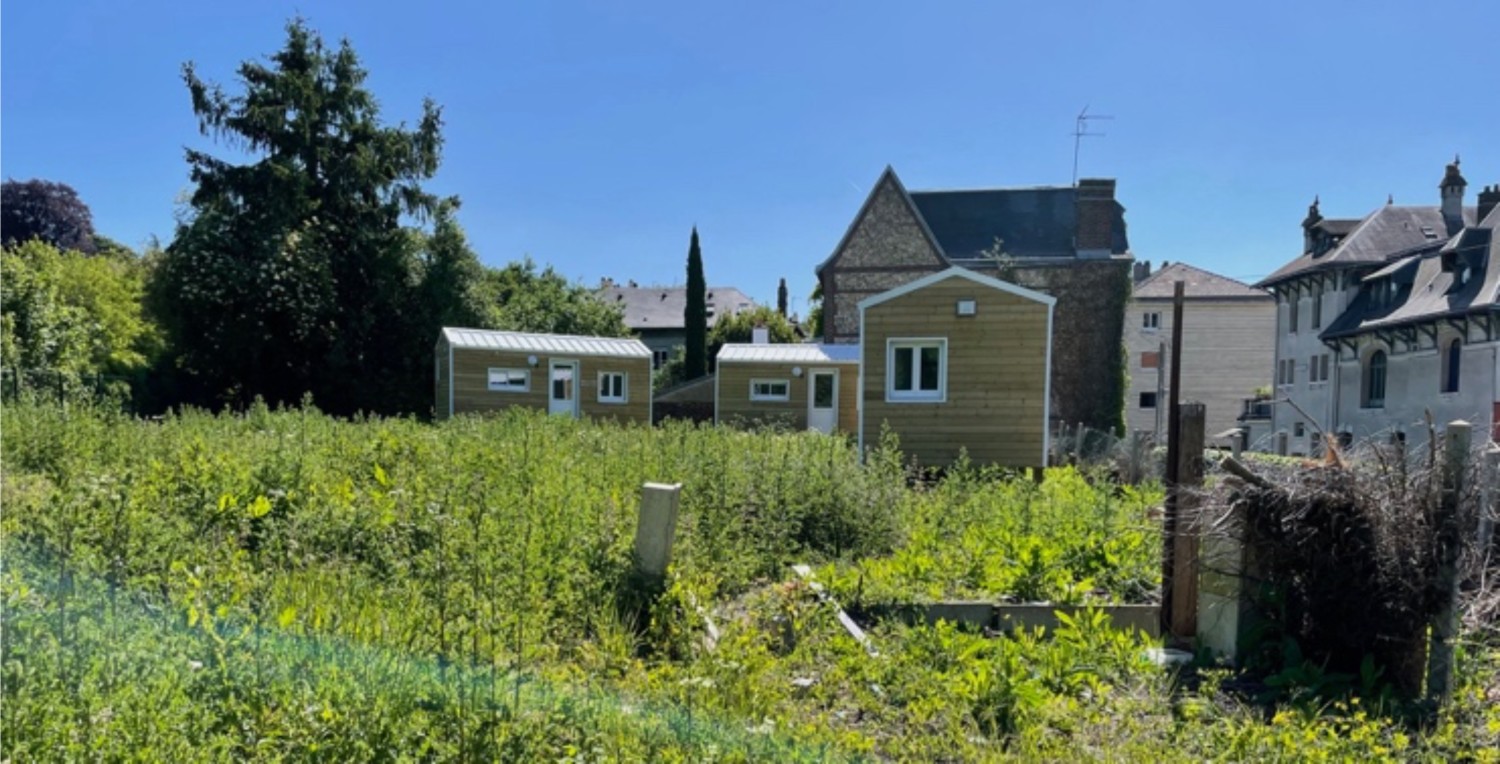Self-helped housing
A project for six tiny houses and a food garden for Fabrik à Yoops Rouen
“Erst kommt das Fressen, dann die Moral” (“First comes food, then morals” Berthold Brecht 1928)
There are good reasons why this is a practical report and not a theoretical paper:
DGJ Paysages has been working on social urban agriculture projects since 2012. In The Hague, we designed Zeehelden Community Garden in 2015 and the Greens in Westbroekpark in 2018 (DGJ Paysages 2025). Experienced in social entrepreneurship, we also work on commercial projects. However, the latter quite often do not lead to the commercial success of our design firm. In both Switzerland and France, we encountered a system that forces designers to reduce the quality of their work for public clients in order to keep budgets down in the face of rising project costs, inflation, increasing regulation and other constraints.
Recently DGJ Paysages decided to select projects more effectively to align with our goals : Climate, Biodiversity and Inclusion. To see how others achieve such goals, we visited Change Now in Paris in April 2025 : "the largest event of solutions for the planet". At the fair, we met Franck Renaudin & his team, a social entrepreneur in Normandy since 2020 (Carrére 2025). Their Fabrik à Yoops provides emergency housing in the Rouen metropolitan area. The inhabitants rent these tiny houses without land cost, while they would not meet the minimum requirements for social housing.
The Fabrik a Yoops model is simple and effective: the association primarily helps people to reintegrate into social life by providing them with a fixed place to rest, meals, assistance with paperwork and job applications, community learning opportunities, and access to washing facilities. This social work is highly efficient given its small facilities: around 500 people have been reintegrated in 2024 at the site in an abandoned hangar in Rouen.
A small number find employment in the association's social entrepreneurial construction workshop next door. There, they build low-cost houses of about 15 m² for around 40,000 euros, meeting local energy and comfort norms. These houses are financed by sponsors who can offset their investment against tax with a fixed return rate.
When the SNCF gave a away a 14 year land lease for 6 houses only few minutes walking distance they wonderd who’s drawing up the garden? DGJ did not need long to negotiate the design job in Rouen.
Is this agroecological urbanism? Yes and no. Yes, because DGJ Paysages will provide an urban garden for growing food and a space for neighbours to share. But no, because there was no urban theory involved. Our role here is simply to provide practical help. We draw up plans for houses that are already in the final production stage for a permit. We provide basic urban planning advice, such as orienting larger windows towards the sun and communal spaces and smaller ones towards noise and shade. We organise public and private spaces, distances, insights, communal areas for the group and areas for neighbours. Revised plans include an easy-to-maintain food garden based partially on permaculture principles.
Design theory and ethics are not particularly helpful for people living in the street. However, once the basic needs have been met, we can consider theory. Perhaps we should ask ourselves how much urban theory or regulation can help. Are practical solutions not much more efficient?
Daniel Jauslin is a landscape architect, educator and researcher with a PhD. He is the founding director of
DGJ Paysages in Switzerland and France and DGJ Architektur in Germany. Having trained in architecture and urbanism at ETH Zurich, he has 25 years of international experience in design, teaching and research, working on projects ranging from public furniture and gardens to regional landscapes and infrastructures.
As project manager at West 8 in the Netherlands, he led designs including the Red Amsterdam Footbridges in 1998 and the Expo.02 Park in Yverdon-les-Bains in 2002. With DGJ since 1999, he has co-authored over 300 projects, including 30 completed works and 25 competition wins.
He has taught landscape design at TU Delft and Wageningen University and is currently a lecturer and international director at ENSP Versailles & Marseille. His research explores architectural and landscape strategies for the Anthropocene, including his PhD, 'Landscape Strategies in Architecture' (TU Delft, 2019), and the related exhibition If Buildings Were Landscapes... (in Zurich, Paris and Delft, 2020–2022). With DGJ Paysages he has also co-founded two community gardens in the Netherlands and a cycling planning network in France.
← go back to
the programme
Photography →
Build-up ex SNCF site, DGJ Paysages
